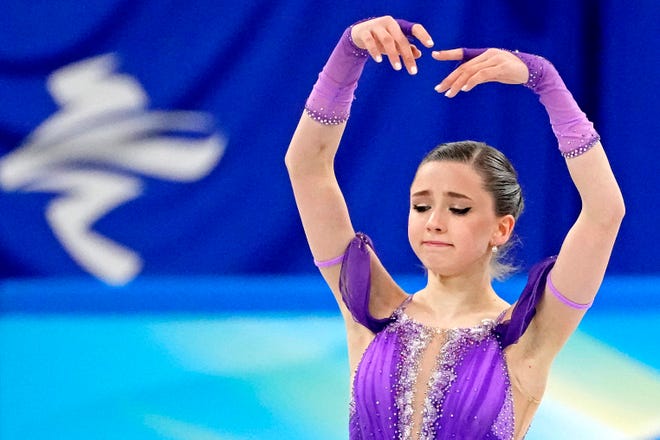
On the surface, the following explanation sounds like just another lame excuse for cheating with drugs in sports:
After an elite Russian figure skater recently tested positive for a banned performance-enhancing substance, her lawyer suggested she ingested the drug unknowingly through her grandfather, who takes the medication for heart trouble. Perhaps she drank from the same glass as him, her attorney said, according to the Dossier Center, an investigative website run by exiled Russian businessman Mikhail Khodorkovsky.
But is that even plausible?
To help shed light on this latest Olympics scandal, USA TODAY Sports consulted with doping experts and reviewed a recent history of this particular drug in sports. This is at least the third straight winter Olympics in which trimetazidine – a banned heart treatment drug – has been a problem. It’s also not the first time an athlete claimed she ingested it unknowingly. In at least one case, an American swimmer eventually proved she didn’t take it on purpose.

Yet a big difference in this case is that the same skater, 15-year-old Kamila Valieva, has been taking two other heart treatment substances – an indication that it could be part of a sophisticated performance-enhancing strategy by the Russians. Either that, or she has heart problems at age 15 while still claiming she took one of those heart medications by accident.
“That information raises a whole a host of questions and seems to point not to a 15-year-old just innocently stumbling into something,” U.S. Anti-Doping Agency chief executive Travis Tygart told USA TODAY Sports Tuesday.
The skater’s other substances
Valieva declared on a doping control form that she was taking hypoxen and L-carnitine, according to a document posted by the Dossier Center from the World Anti-Doping Agency. These two substances are not banned by the WADA but can be used to treat heart issues.
Along with the presence of trimetazidine, this raises red flags for Tygart of USADA. That’s because L-carnitine, a dietary supplement, is used to boost metabolism and fight fatigue. Similarly, hypoxen is used to treat oxygen deficiency and fight fatigue as well.
WHAT IS IT? What is trimetazidine and how is it used?
Hypoxen is a drug that is not approved for use in the U.S. and is advertised by a Russian company, Cosmic Nootropics, as being “used by athletes to improve physical performance, yet it is not on the WADA Prohibited List.”
Likewise, the heart treatment drug trimetazidine helps with endurance but is not approved for use in the U.S. It is listed by WADA under the category of banned “hormone and metabolic modulators” for athletes.
“You use hypoxen and L-carnitine to get the performance benefits, and hypoxen is advertised as reducing hypoxia, shortness of breath, tiredness, all of which would be a perfect fit for someone who’s skating in two separate events … having to do a long program and a short program,” Tygart told USA TODAY Sports.
He said the combined “cocktail” of these three substances used by a 15-year-old Olympic athlete is indicative of a sophisticated performance-enhancing strategy by the Russians, who have a long trail of systematic doping. He said otherwise it’s hard to believe that a 15-year-old would “have the wherewithal and sophistication to be knowingly taking these substances to increase their importance or have the resources to find them.”
If the skater has actual heart issues requiring medication, Tygart questioned whether she would need all three of these drugs for it, which also happen to be used for performance-enhancing reasons.
The skater's mother said at a recent hearing on the matter that her daughter was taking hypoxen to treat "heart variations," according to the WADA document. WADA declined comment.
This substance in the Olympics
This marks at least the third straight winter Olympics in which trimetazidine has been a problem. But this is the only one of those three cases in which the athlete who tested positive for it was not disqualified.
In 2014, Ukrainian cross-county skier Marina Lisogor tested positive for it and was expelled from the Sochi Games despite saying she took it in her medication unknowingly.
In 2018, Russian bobsledder Nadezhda Sergeeva was disqualified from the Pyeongchang Games after testing positive for the same substance. In that case, a Russian medical official suggested the bobsledder’s mother, a doctor, gave her heart medicine containing the substance.
In the current case, Valieva has not been disqualified. She is scheduled to skate in the long program at the Beijing Olympics on Thursday night after the Court of Arbitration for Sport ruled in her favor Monday, in part because of her status as a "protected person" under world anti-doping rules as an athlete under age 16. The drug sample at issue was collected Dec. 25 in Russia, but the findings were not reported by the lab in Sweden until Feb. 8, according to the International Testing Agency.
“The concept of contamination is valid,” said toxicology expert Pascal Kintz, who manages a forensic consulting business in France. He told USA TODAY Sports in an e-mail that it depends on the concentration in the urine and how the athlete was in contact with the drug.
Valieva’s test revealed 2.1 nanograms per milliliter, according to the WADA document. Kintz called this a “low concentration.” Two scientific experts working on her behalf at a recent hearing took the position that the concentration was compatible with contamination but also acknowledged that it was compatible with the end of the excretion period after a full dose of trimetazidine, according to the document.
It’s still a much higher concentration than was found in former U.S. National Team swimmer, Madisyn Cox, who initially suggested she ingested the same substance by drinking tap water in Austin, Texas. She was suspended for two years by FINA in 2018 after 0.1 nanograms per milliliter were detected in her urine, according to case documents.
She later submitted two bottles of her Cooper Complete Elite Athlete multivitamin for testing at a WADA-accredited lab in Utah. Trimetazidine then was detected at approximately four nanograms per tablet in those multivitamins. Her suspension later was reduced to six months.
Tygart points out that the Cox case involved levels of trimetazidine that were many times lower than the level reported in the case of the Russian figure skater.
“I think you need more than just, 'Oh, my grandfather takes it,’” in this case, Tygart said.
Follow reporter Brent Schrotenboer @Schrotenboer. E-mail: [email protected]









